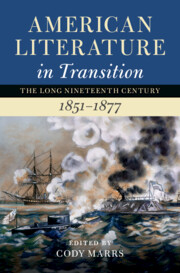Book contents
- American Literature in Transition, 1851–1877
- Nineteenth-Century American Literature in Transition
- American Literature in Transition, 1851–1877
- Copyright page
- Contents
- Figures
- Contributors
- Series Preface
- Introduction
- Part I Careers
- Part II Networks
- Part III Exchanges
- Chapter 13 Literature and/as Philosophy
- Chapter 14 Literature and/as Science
- Chapter 15 Literature and/as Ecology
- Chapter 16 Literature and/as Economics
- Part IV The Long Civil War
- Index
Chapter 15 - Literature and/as Ecology
from Part III - Exchanges
Published online by Cambridge University Press: 15 June 2022
- American Literature in Transition, 1851–1877
- Nineteenth-Century American Literature in Transition
- American Literature in Transition, 1851–1877
- Copyright page
- Contents
- Figures
- Contributors
- Series Preface
- Introduction
- Part I Careers
- Part II Networks
- Part III Exchanges
- Chapter 13 Literature and/as Philosophy
- Chapter 14 Literature and/as Science
- Chapter 15 Literature and/as Ecology
- Chapter 16 Literature and/as Economics
- Part IV The Long Civil War
- Index
Summary
The period from 1851 to 1877 is a critical transitional moment when ecology as a scientific field of study did not yet exist but was emerging. American scientists tended to rely on a Romantic science that prioritized nature’s organicism, but their criteria for empirical observation would lead to detailed and differentiated views that would help shape a modern ecology less insistent on holistic ideals and more open to incomplete and mutable forms in nature. For many writers, naturalists, and scientists, their approaches to nature were explicitly tied to considerations of the relationship between matter and spirit, and to the study of nature as a legible “book” whose material language, or littera, was inscribed everywhere as the environment and as forms of life.1 Scientific and cultural knowledge in this era shared an understanding that one could observe, that is, “read” nature. “Metaphor,” “type,” “translation,” and even “leaves” were objects of both biological and literary study. Through the sciences of this period, we can see how scientists interpreted nature as a literary text; and through the literature, how nature was read and written as a living thing.
Keywords
- Type
- Chapter
- Information
- American Literature in Transition, 1851–1877 , pp. 241 - 254Publisher: Cambridge University PressPrint publication year: 2022

